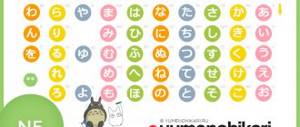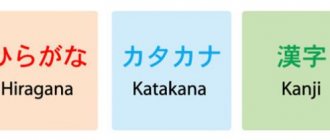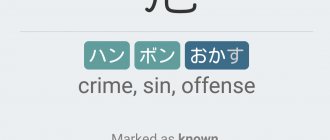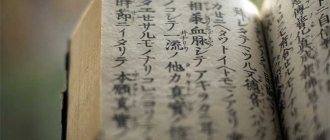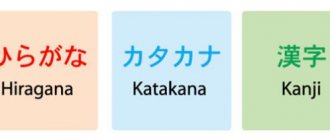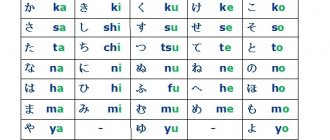What to do if you can’t learn Japanese or if you don’t have a predisposition for Japanese and languages in general?
Today we will have more of a conversational video and we will discuss why you may not be able to learn Japanese.
No! Not difficult at all!
Let me make a reservation right away - this is my subjective opinion based on my observations. If you don’t like my point of view, then just ignore it and continue studying as you did. So, let's begin!
Usually, when they say something like “I don’t have a predisposition for languages,” this means the following: “It would be nice to learn a language, but of course I won’t do it.”
You may not succeed in only one case - if you do not have the proper motivation . Sometimes I get questions like: “How can I find motivation to learn Japanese?” And then I fall into a stupor. What can we even be talking about? After all, motivation is your desire to learn Japanese; if there is no desire, then how can I find the desire to do something for another person? No way!
Motivation in Japanese is the only and truly important reason why you will not be able to study Japanese properly. Some talk about some kind of linguistic predisposition and that languages are not good for them and the weather outside is not the same, but this, to put it mildly, raises my doubts and I will tell you why later.
Before Japanese, I learned other, much easier languages, but they were not easy for me, because I told myself that languages were not good for me. Then I started studying Japanese and everything went with a bang, but then, to enter a Polish university, I needed Polish and English, and then I finally realized that motivation is a key point in progress and in achieving results .
And I disagree with those who say that you only need a PURPOSE to learn a language and motivation will appear. For example, the goal may be to enter a university, get a job, etc.
For me personally, it didn't work at all. It was 10 times easier for me to learn Japanese, despite the fact that Polish is an extremely easy language if you know the Slavic language. But I couldn't bring myself to do it. At the same time, I didn’t need Japanese for a specific purpose, but I did need Polish. I understood that I needed this, but the goal alone will not satisfy you.
Why did Japanese go tens of times faster? Because I had a wild interest in the Japanese language and a constant desire to learn something new and learn some tricks of the language, I was constantly listening, watching, reading something in Japanese, although I didn’t understand 90-95% of what I heard and I see, I was interested.
But with Polish, I was not eager to study and had only one goal - to enter a university. That's all. After university, I immediately forgot even what I knew, and I didn’t know as much as I could have. And when they say that you can gain motivation by setting a goal, for example, to enter a university or find a job, I strongly disagree with this. These are all external factors, but you need internal motivation.
No matter how much you want to go to university or find a job, if there is no constant fuse, i.e. proper motivation, then you will not be able to maintain your interest at the proper level and, accordingly, there will either be no progress at all, or it will be scanty, as it was for me. I cannot speak for everyone, I speak only about my experience and the experience of those I know.
Why is it impossible or difficult to learn Japanese?
Motivation is a fire that should constantly burn, and the goal is to get somewhere, etc. and any other external motivation is more of a wick that will burn out sooner or later, because... You only feed yourself with the future.
Yes, having a goal is not bad , and even good, but this is not the key point . And in order to heat the internal stove, you need to get a lot of firewood from outside now. A little later we will talk about what kind of firewood I am talking about and how to get it.
This can be represented in the form of a pyramid, where the basis, the foundation of everything is your INTERNAL motivation , i.e. Your desire to do something constantly. After all, you cannot build anything great on the foundation of a barn.
No external motivational influences will affect a person if he does not have his own internal motivation, this core.
The larger and stronger the foundation, the better the next step will stand.
Next comes the 2nd stage of our pyramid - this is the competent selection of educational material and the choice of courses/tutors, etc. Since not everyone can (or can, but does not want) to afford a tutor, regarding the second stage we also had an article about the necessary educational materials for learning Japanese, where we completely closed this question of how to study on your own. Usually all construction ends here.
The third stage of our structure is various techniques about which there were also a lot of different articles, for example, about how to learn more than 100 kanji in one sitting or how to quickly learn foreign words. And there will be many similar ones in the future. These videos cover the issue of the 3rd stage of our construction.
It often happens that instead of a good foundation, they lay some kind of foundation and put a second step on it, thinking that such a foundation will do, but this is not so, sooner or later everything will collapse. And even if by some miracle everything remains shaky, look at how tall your building will be. Do you like it? Does it look tough?
How long does it take to learn Japanese?
What is your goal?
Do you want to watch anime in the original? Do you want to work with Japanese companies? Do you want to live in Japan or become a translator? We can say that after a few months of learning Japanese for 1-2 hours a day, you will already be able to watch anime with Japanese subtitles and have a good understanding of what is being said. We can't give you an exact figure because it depends directly on your desire to learn Japanese and the whole equation depends on this variable. You will hear different numbers everywhere because people teach differently and therefore get different results. If a person taught Japanese for 10 years and decided that Japanese can be learned in only 5 years, then, as a rule, he will not constantly look for new learning methods and try to reduce this period. Rather, on the contrary, a person will resist all innovations, defending his original statement. So take your learning into your own hands and don't listen to anyone (not even us). Always look for the most effective ways to study and work at your own pace . With the advent of the Internet, this has become easier than ever.
The best thing you can do is start now and come back to this issue in a couple of months, when you already understand the structure of the Japanese language, the amount of work ahead and how long it will take you to reach your goal.
Set the right goal and have fun
How long does it take to learn Japanese? The answer is long. We can even say so - for a long time . But whether it will be difficult depends only on your attitude towards learning. If you mutter to yourself that learning Japanese is hard work that not everyone can do, then your prophecy will come true and learning Japanese will become hard work for you. If you enjoy the process of learning Japanese, then what does it matter to you how long you study? In this case, on the contrary, the longer the better.
But whether it will be difficult depends only on your attitude towards learning. If you mutter to yourself that learning Japanese is hard work that not everyone can do, then your prophecy will come true and learning Japanese will become hard work for you. If you enjoy the process of learning Japanese, then what does it matter to you how long you study? In this case, on the contrary, the longer the better.
Let's say you start learning on Kanjiway today and in a month you will learn 500-1000 kanji. When watching an anime with subtitles, you will understand, for example, 15% of what is happening. At this time, your brain will try to sort out all the incomprehensible information and in a couple of days you will understand 16%, and after another couple of days - 17%. Step by step and day by day you will get closer to the mark that is your goal. But the secret to successful learning is that you must stop focusing so much on the end point of the journey.
Your correct goal should not be “Learn Japanese”, but “Increase your Japanese skill by 1%”.
Learning Japanese should be an enjoyable experience that you'll want to do when you get home from work. Learn Japanese not with textbooks, but with what you enjoy - be it anime, e-sports, painting or music. If you set yourself the goal of “learning Japanese” and constantly follow it, then every day you will ask yourself: “Did I learn Japanese today? Do I already understand Japanese football commentators?”, to which you will receive a negative answer for a long time and will finish studying much earlier than you achieve your goal. The paradox is that if you are very serious about learning the Japanese language, then first of all you need to stop taking it “seriously” and start taking it more measuredly, understanding the simple features of human psychology. When you start learning Japanese, it will become a part of your life and you need to manage to position it in your life so that it does not become a “thing to do”, a “responsibility to yourself” or a “tool that is not yet profitable” "
If you learn to follow the Japanese path step by step and set yourself the goal of “Increasing your Japanese skill by 1%,” then you will get the result not in a few months or years, but in a week or two. In addition, you will feel and understand that you are constantly moving forward and will accomplish not just one goal, but 70-100 goals along the way. Each of us has in our heads “Ordinary human brain, 1 piece.” If you constantly think about how to “learn Japanese”, then your brain will look at what is behind this thought and see 2500-3500 kanji, thousands of words and sentences and months of work. After which he will logically tell you “SO STOP STOP STOP, LET’S NOT GO THERE, LET’S BETTER WATCH YOUTUBE.” If you start constantly thinking about how to “increase your Japanese level by 1%,” then your brain will look at this thought and see 100-200 kanji there and say “Well, in principle, it’s not bad, you can try.”
Maybe even now you are thinking that “Japanese is very difficult, I’m unlikely to be able to learn it. And in general it takes a long time and is not particularly necessary.” In this case, stop thinking about how to learn Japanese and ask yourself “If Japanese is so difficult to learn, then maybe I’ll only learn 1% for now, and then we’ll see?” When you learn 1%, then stop and ask yourself, “Japanese is still very difficult, but maybe I can learn at least 2%, and then we’ll see?” If you want, instead of "1%" say "100 kanji" or "200 words". Surely you can learn 7 hieroglyphs a day and learn 100 hieroglyphs in 14 days?
You must understand that when you reach your ultimate goal and “learn Japanese”, then it will cease to be a special thing for you and will become an ordinary thing. Remember, for example, how much you enjoyed driving the first year after getting your license and how you feel about it now, or how happy you were when you bought your phone and what place it has in your life now. Or think about how often you remember that you know Russian and how cool that is and how you felt about it as a child when you first learned to read. Those parts of the Japanese language that now seem difficult or routine to you, such as learning kanji or not understanding new words - in a couple of years you will look back on them with fondness, realizing that the golden time was then (that is, now). Unfortunately, you can't just decide and start enjoying the process right away, but you can learn. So start learning now. Your brain and mood will thank you for it. 
In the words of a classic: “We should be happy, we shouldn’t stress.”
Well, how long does it take to learn Japanese?
We hope that after reading this article, you begin to understand that “How long does it take to learn Japanese?” - this is the wrong question . If you ask yourself this question and look for an answer to it, then you will never learn Japanese . Your brain will decide for you that it is better not to waste time on such a long goal. Therefore, you must ask yourself the right question and ask yourself, “How long will it take me to achieve my goal?” What is your goal? Correct - 1%.
But you probably came for a specific number, so here is an approximate time frame for how long you will learn Japanese on Kanjiway :
- In the first month you learn hiragana, katakana and 100-300 kanji. You will be able to read hiragana and katakana, but you will not always understand what the word or sentence itself means. You will also be able to read simple sentences with learned kanji in Japanese and have a good understanding of what is being said.
- Over the next 2-3 months you continue to learn kanji and already know 1000-1500. You already understand enough to read average Japanese texts and watch Japanese anime/series with subtitles and understand about 40-60% of what is happening. You periodically look at the dictionary when you don’t understand something.
- Over the next 2-5 months, you increase the number of kanji to 2500. Now you understand Japanese text well and can watch anime/series with subtitles without any problems and not have to look at the dictionary every 10 minutes.
- You've learned all the kanji you need, but you still need to review them occasionally. You log into Kanjiway for another 1-3 months a couple of times a week and repeat the rarest kanji that you may sometimes forget.
We would like to clarify that by “learned kanji” we mean not just “read it once and remember it,” but “memorize it once and repeat it 4-10 times.” That is, maybe you still read kanji not as quickly as the Russian language, but you don’t need to look for their translation, you already remember it well.
In total, we ended up with about 6-12 months on Kanjiway. As you can see, the main training occurs in the first 2-4 months. We're giving average numbers here, but in reality you can go much faster if you want. Since Kanjiway is not a “Japanese course” in the classical sense, you don’t have a group of students with whom you need to stay on the same level and not run too far ahead. We do not put any restrictions on you and you can learn at the speed that is convenient for you.
Without the first step there will be no rest.
I met people who had the necessary materials (floor 2) and teachers (floor 2) and they had all sorts of techniques in their arsenal (floor 3), but in the end, without a foundation (floor 1) their whole pyramid collapses like a house of cards. Simply because there is no normal foundation. By taking away something from above you can still somehow learn, but without the bottom element of the pyramid there will be no top ones. Sooner or later!
It is important to understand that you will not be able to build a “reverse” pyramid, no matter how hard you try. For some reason everyone forgets that the 2nd stage is not the most important and not the 3rd stage. And especially not the very top of the pyramid. The foundation is important, our first step.
If we have figured out the foundation and main floors and imagine that everything is fine here, then next I want to tell you what “bricks” we need to use to complete the pyramid so that it is larger and stronger, because each step will add +2% to your knowledge . Let each next step be much smaller in size, but still, the building will be higher than the others. Each brick will allow you to build a pyramid a little higher and stronger, and this will make up a whole system.
Yes, this is not much, and more effective methods were in previous videos that really work here and now. And when properly mastered, they provide a strong increase in knowledge.
True, there are several more effective techniques that I saved for later, which will also go into the 3rd stage, but more on that later. However, if you have mastered the previous videos and do not know how to make your training even more effective, then watch further. This will not give a colossal effect, but using every additional brick, even the smallest one, in total you will get a greater increase than those who do not. We will talk about this in the second part.
Returning to the main question of the video, why do some of you fail to learn Japanese? Yes, because now you have a foundation from a barn, and not from a pyramid.
Study methods
You can learn Japanese in different ways: on your own, in group lessons, or one-on-one with a teacher. The choice is a personal matter for everyone, because the most important thing in learning a language is motivation. If it is, any of these methods will bear fruit.
Group classes
In any major city you can find a linguistic center or school that offers learning Japanese from scratch in a group. Teachers in such centers usually not only know the language perfectly, but also have effective techniques for memorizing words. Good specialists are able to make the learning process bright and interesting. But you should remember that if you want to learn a language quickly, in addition to attending classes, you must cram hieroglyphs at home and write them down, do exercises and pronounce phrases and words.
The disadvantage of such classes is that the level of language proficiency among students in a group is always different, as is the speed of acquisition. And even if you turn out to be more capable than others, you will have to adapt to them.
Individual training
Unlike group classes, private lessons allow you to study at your own pace. The teacher will adapt only to you. The frequency of classes can also be adjusted depending on your needs. This option would be ideal if it were not for the high cost of individual lessons.
Self-study
This method is good because you don’t have to pay anyone, and the class schedule will depend only on your own desires. But you need to keep in mind that when learning a language on your own, it is very easy to relax, and the process of mastering can take time.
Finding a good textbook is very important. The textbooks “Reading, Writing and Speaking Japanese” by E.V. receive good reviews. Strugova and N.S. Sheftelevich and “Japanese for Beginners” by L.T. Nechaev. They have a drawback - vocabulary that does not meet the needs of modern life. Therefore, expressions and phrases can be taken from other textbooks, for example, from the Japanese editions of Genky or Try, where there are very lively dialogues.
The first step is to learn the syllabary alphabet, which includes 146 syllables, then move on to studying hieroglyphs and grammar. To communicate fluently in Japanese, you need to know about 2,000 hieroglyphic characters. It is very difficult to remember such a number, so many teachers teach to use figurative thinking for this.
The slower the better.
I constantly hear about some intensive courses where they try to download information from a couple of months or a year of study to people in a couple of days, and a person may get a Wow effect, but time will pass and you will be like a blank slate.
Break up the material, memorize it in parts, it is better to return to the material constantly throughout the day for several minutes than to do everything at once in 1 hour. Even on this scale it works better, not to mention the 2-3 days of intensive work. Yes, I have a video where I tell you how you can memorize 70 kanji at a time, etc., but this does not mean that you need to try to memorize 70-100 hieroglyphs every day, especially at one time. It is necessary to split the information into blocks to make it easier to assimilate the material. That is, even after learning 70-100 hieroglyphs, you need to work on them block by block, and not learn the next 70-100 hieroglyphs.
In terms of time required to study
In this sense, Japanese is quite complex: at the maximum level (like a native) you will need 2800 hours, at a very high level - 1700 hours, at a high level - 1300 hours and at an average level - 900 hours. You also need to listen or watch in this language (for example, a TV series with Russian or Japanese subtitles): at the maximum level (like a native) you need to watch about 5000 hours, at a very high level - 3000 hours, at a high level - 2000 hours and at an average level - 1000 hours. However, this is not a problem, because listening is fun. You watch the series not to learn the language, but to enjoy watching it. However, it is impossible to learn a language without listening; it is mandatory. For more information, see our article How long does it take to learn Japanese.
Don't just study from textbooks
There is a type of people who learn Japanese exclusively from textbooks or, for example, exclusively from what they are asked, thinking that this task is quite enough. Yes, this is enough to be able to speak according to the course program, but in real life there is something more. This simply cannot be taught.
People speak differently, use many different things that are not in any textbook, and in theory it is simply impossible to teach a person many things, so you are deprived of the upper floors of the pyramid. Usually people try to finish the top floor somehow when they already arrive in Japan and practice begins, but what prevents them from trying to finish it at the training stage?
Hiragana
How to learn Japanese from scratch? In the process of independent and group study, different forms of words are not assigned. The latter do not change their own shape according to persons, taking into account their belonging to the defining genders and numbers. Plural in a word - the corresponding particle is placed at the end of each word being changed. Having learned this rule, the plural form will be easy for you in the future.
Language has no ending, no forms indicating the future tense. There are three different degrees of politeness in spoken language:
- friendly communication between interlocutors - the appeal is on You;
- official conversational speech between interlocutors - the address is addressed exclusively to you;
- The rules also provide for respectful treatment in everyday communication.
The phonetics of the language and speech sounds are often reminiscent of Russian, with a number of nuances. The difficulty for teachers and students in learning a language is writing, represented by hieroglyphs.
MEDIA
Use Japanese language media in your life! This is the very firewood for your internal motivation. Do you like listening to music? Why not listen to Japanese music. The choice is huge. Do you like listening to the radio? Listen to Japanese radio. Do you like playing games? Play games in Japanese! Do you read manga? Read manga in Japanese! Do you like watching dramas? Why do you watch dramas with Russian dubbing? I know that there are such people.
Yes, dramas with subtitles are also relatively ineffective in learning, but if you watch the same thing several times only without translation, this will, after all, give a small increase.
And it will give a general understanding of how the Japanese speak, what suffixes they use and when, how they construct sentences. In what situations do they say this, and in what situations do they say that? It’s better, of course, to use dramas rather than anime, because anime has completely unrealistic dialogues and situations.
Please note that now I do not urge you to use absolutely all resources, as long as you do it, no! What I’m saying is that you need to find what you already do. You’re interested in Japan, what do you like? Find something that will motivate you to do something every day. Maybe you like origami, then read the instructions in Japanese, etc.
You need to use everything, manga will give you a boost of a couple of percent, music, dramas and others will also increase your level by a couple of percent, it won’t necessarily be something practical in the form of something tangible in the form of learning a bunch of words, etc., but in a compartment it will greatly expand your understanding of Japanese and will be very useful to you in practice in the future.
And for those who are really trying, but have some problems with memorizing or studying, I will try to suggest what else you can pay attention to and, perhaps, these obvious rules will help improve your performance by a couple of percent.
These are the smallest, but still bricks.
In the process of memorization, neurons and synaptic connections between them are actively used. The more actively this connection is used, the better the memory. When new information is received, new connections (chains) between neurons begin to be built. Connections are knowledge and memory. Learning and new experiences create new connections, and repetition strengthens existing old connections.
But you must understand that only nothing will come from nothing, so we need the building material from which everything consists - i.e. protein. For good memory and brain function in general, you need a sufficient amount of protein, which consists of amino acids. To simplify everything, then everything is simple - eat complete protein, namely eggs, meat or fish. You can also include dairy products here. *I’m not a nutritionist or a doctor, so this is up to your taste and discretion*
Features of the Japanese language
Hieroglyphic languages are difficult in that spoken language and writing must be studied separately. And in the Japanese language there are as many as three writing systems. Two of them - hiragana and katakana - are syllabary alphabets. Hiragana is used to convey grammatical relationships between words, and katakana is needed to write foreign and borrowed words. To indicate the base of a word, kanji is used - hieroglyphs that passed into the Japanese language from Chinese. If you have forgotten which character represents the word you need, you can also use hiragana.
Katakana
Word order in Japanese sentences is not particularly difficult. You just need to remember that the predicate is always placed at the end of the sentence, and the definition - before the defined. The subject is sometimes omitted if the context makes it clear who or what we are talking about.
Hiragana
When learning Japanese, you don’t have to memorize all kinds of word forms - they don’t change according to persons, genders and numbers. The plural form is indicated by a particle that is added to the end of the word. There is also no future tense form in Japanese.
And one more feature - three degrees of politeness in conversation:
- Normal friendly communication, on a first-name basis.
- Speech for formal occasions, on “you”.
- Respectful speech.
As for phonetics, the sounds of Japanese speech are similar to Russian ones with some nuances. From all of the above, it becomes clear that the most difficult thing in learning Japanese is writing.
RUN
Run more often. It can also be assumed that running also has a positive effect on the creation of new nerve cells*.
*Nerve cells are our intelligence, memory, creativity and other cognitive functions.
This is based on one mouse study where there were 2 mice and 1 of them did not have a wheel to run on. The other mouse had a wheel and could run. There was a huge difference between them in creating new neurons. The mouse that ran created many more of them. Since there is no clear data on this topic, just follow the standard recommendations of regular jogging or keep yourself in shape in other ways.
Or it’s just a placebo effect, but even if it’s self-hypnosis, it bears fruit.
Compared to other languages (in terms of learning time)
The easiest way to compare it is with English:
- Japanese uses 30 thousand words (2000 hours to study), and English only 20 thousand (1333 hours to study).
- In Japanese you need to know 3 thousand characters (600 hours to study), and in English 26 letters (5 hours to study).
As a result, to learn Japanese to a level close to native, you need about 2800 hours, and in English about 1500 hours are enough (without taking into account the time for listening, which was mentioned above). Of course, most people don’t need such a high level, but even at lower levels in Japanese you need to know 1.5 times more words than in English, and you also need to know 1.5–2.5 thousand characters (300–500 hours to study). As a result, Japanese is much more difficult than English, as it requires approximately 1.9 times more time to learn.
Dream
The most important thing is Sleep! You probably know that new neural connections are created during sleep.
At the same time, the restructuring of connections between neurons does not occur at any time. Since this process is not very fast, in order to rebuild connections between neurons, we need regular sleep. And this is one of the main functions of sleep.
Everyone has their own optimal time for sleep, but there is one recommendation for everyone, which says that you need to sleep at least 6, but no more than 9 hours.
All these recommendations will actually not fundamentally affect your study; they will improve, but will not radically change the situation. What is really important is the motivation and the tools that I have given before and will continue to give. Try to honestly answer the question: “Do I really want to learn Japanese?”
One more thing
What about JLPT?
We recommend treating JLPT in the same way as textbooks. Periodically review what you need to know to pass the JLPT, but don't base your Japanese learning on it. Even JLPT Level 1 (the highest) is not an indicator of mastery of the Japanese language. Yes, of course, this confirms that you are very well versed in Japanese and this is a very great achievement, but it does not guarantee that you know Japanese even close to how the Japanese themselves speak it.
JLPT is aimed at foreigners, so the Japanese treat it as such. In essence, JLPT is like the Unified State Exam in Japanese. You won’t claim that you know physics well if you passed the Unified State Exam in physics? Yes, this exam confirms something, but it does not tell you that you can already go design bridges and rockets.
If you know English, we recommend watching this video to understand why the JLPT should not be considered the main measure of your knowledge of Japanese.
Features of Japanese culture
Each culture has its own characteristics. For Russians, they begin with a special path, spiritual unity and bonds, and end with stereotypes about vodka and bears. One of the prominent features of Japanese culture that is important for us to learn Japanese is that the Japanese consider themselves to be a “special kind of people.” Of course, it’s not official, but this understanding exists at a cultural level and the average Japanese understands this as well as the average Russian is accustomed to the corruption of officials and leaky roads. They live on their own island, they have a mono-ethnic state with one of the strongest economies in the world. Most people there have absolutely no need to have any contact with other nations on the planet. They also treat the Japanese language as a “special” language and do not take seriously stories that a non-native Japanese can learn Japanese as well as a Japanese himself. They don't expect foreigners to speak Japanese well, and even if you barely string two words together, a polite Japanese person will still tell you that %USERNAME%-san's Japanese is excellent. Therefore, you should often not count on the Japanese to help you improve your Japanese in any way. Even if you ask them to correct you every time you make a mistake in your speech, they still probably won't do it because of their notions of politeness. Take your learning into your own hands , don't listen to anyone who tells you that Japanese is super hard and impossible to learn. Don't listen to those who say that Japanese can be learned in two months, nor those who say that Japanese can be learned in at least five years. Start understanding the Japanese language yourself and over time you will find answers to all the questions that are important to you.





